The perfect RV battery would be one that manages to be lightweight while still providing adequate power, reliability, longevity, and resistance to vibration.
No one wants to be stranded in the middle of nowhere, so it’s important to have a reliable power supply when you’re out in the woods.
That’s why we’ve gone with a selection of completely maintenance-free batteries—the best kind for long RV journeys because they don’t need any particular attention.
How Do We Choose Batteries For RV?
It can be difficult to choose the best RV battery among the numerous available options. We have simplified your search by selecting 10 different kinds of batteries that excel in power, longevity, cost, and dependability.
We’ve done extensive research on forty various batteries online, tested thirty different models, and interviewed twenty-four RV aficionados. The following are the top 10 RV batteries that we think are ideal for regular usage, based on our research.
What Is the Best RV Battery?
Let’s begin with lithium batteries, which are the top choice for RV users seeking the best performance. These batteries are ideal for setups with inverters and solar systems due to their numerous advantages:
- Lightest RV batteries
- Long-lasting
- Super compact
- Highly efficient with large draw
- No maintenance required, with great warranties
- Very low internal resistance, supporting deep discharges
Lithium batteries outperform other battery types in many ways. However, their higher upfront cost is a downside, and they can’t be charged in freezing temperatures. Fortunately, this can be mitigated with heating pads and a Battery Management System (BMS).
For lithium batteries, Battle Born is my top recommendation. It’s highly efficient, though it does come with a higher initial investment.
Next, let’s talk about AGM batteries, which are sealed, maintenance-free batteries. Here are some factors that can damage traditional lead-acid batteries:
- Overcharging or excessive discharge
- Leaving the battery depleted for extended periods
- Exposure to excessive heat
When choosing a high-quality, maintenance-free battery in the AGM or Gel category, I recommend the INTERSTATE battery. It’s a top performer in this category, offering a great balance of reliability and longevity.
Universal Power Group 12V 100Ah Battery
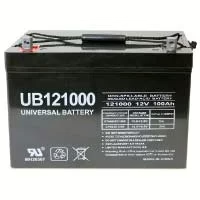
- Weight: 63.93 lbs
- Dimensions: 12.17 x 6.61 x 9.16 inches
- Composition: AGM (Absorbent Glass Mat)
- Voltage: 12 Volts, deep-cycle type
- Warranty: 1-year, can be mounted in any position, ideal for RVs
Universal Power Group 12V Battery Review for RVs
The Universal Power Group 12V is a solid option for RVs, especially when paired with solar kits. I tested four of these deep-cycle batteries, pushing them up to 1500 watts for 30 minutes without experiencing any significant voltage drop. After 30 minutes, the voltage returned to 12.8V, which is excellent for an AGM battery.
While the Universal Power Group 12V batteries are large and heavy, their performance is outstanding for an AGM type. They can be mounted in any position, but because of their weight, make sure to install them in a location where this won’t pose an issue.
Key features include:
- Valve-regulated AGM technology for leak-proof performance and minimal maintenance
- High energy density, offering excellent value for money
- Consistent power output, ensuring no fluctuations during RV use
I’ve had no issues with power consistency in my Forest River FR3, and despite some complaints about a short lifespan from others, my batteries have been running fine for the past 9 months. It’s possible that those facing issues may not be maintaining their batteries properly—such as failing to charge them on time or letting them sit unused for too long.
Overall, the Universal Power Group 12V is a solid choice for RV deep-cycle batteries, offering consistent power and great value. This could very well be one of the best RV batteries out there.
Pros
- High Energy Density
- Robust Build Quality
- Superior Cold Temperature Performance
- Great Value for Money
Cons
- Takes longer to charge
The Universal Power Group 12V battery offers a solid balance of performance, durability, and affordability, making it a reliable choice for RV enthusiasts. With high energy density, it provides ample power for extended off-grid trips, performing well under heavy loads with minimal voltage drop. Its robust build quality ensures durability, and the valve-regulated AGM technology makes it leak-proof and low-maintenance. Additionally, the battery performs excellently in cold temperatures, making it a great option for winter RVing. Overall, it provides great value for money by delivering consistent, reliable power at a competitive price.
However, the battery’s heavy weight is a downside, requiring careful mounting to ensure stability and safety. Some users have also reported a shorter lifespan than expected, though this is often due to improper usage, such as not charging the battery regularly or leaving it unused for long periods. Despite these minor issues, the Universal Power Group 12V remains a solid choice for RV owners looking for dependable performance at a reasonable cost.
Optima OPT8016-103 Deep Cycle RV Battery
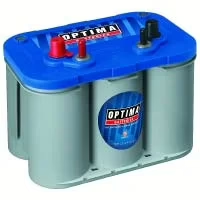
- Weight: 43.5 lbs
- Dimensions: 10 x 6.88 x 7.8 inches
- Voltage: 12 Volts
- Reserve Capacity: 120 minutes
- Marine Cranking Amps: 870, 15x more vibration durability, ideal for boats and RVs
The Optima OPT8016-103 battery stands out due to its spiral cell technology, offering almost three times the life expectancy and stronger starting power than any typical lead-acid battery. This unique technology makes it a robust and reliable power source for campers and RV users, ensuring it doesn’t fail like cheaper alternatives.
The Optima OPT8016-103 is a dual-purpose battery, suitable for both starting and cycling. This makes it ideal for RVs and boats that require strong cranking power, even in tough conditions. With 750 cold-cranking amps, it performs excellently in cold weather, making it highly reliable for winter camping or boating.
Engineered specifically for recreational vehicles, it features a high reserve capacity for longer shelf life, ensuring that your power source stays reliable over time. While Optima batteries have chargers rated specifically for them, other chargers, like the Pro-Logic smart charger, can also work well with this battery.
One key feature is its charging flexibility: if the battery is down to 10 volts, you can charge it at 10 amps or 20 amps for a short time to help it recover, and then drop down to 2 amps for maintenance. However, it’s crucial to remember never to charge a frozen battery in cold climates.
Difference Between BlueTop, YellowTop, and RedTop Optima Batteries
BlueTop:
The BlueTop Optima battery is designed with a traditional auto-post terminal on the top, along with a 5/16 stainless steel stud terminal to accommodate ring-style boat terminals. It offers both cycling and starting capabilities, making it suitable for RVs, boats, and other recreational vehicles. The battery provides 750 cold-cranking amps and 870 marine cranking amps at 32°F. Its deep cycle capacity is around 54-55 amp-hours, making it a solid choice for both starting and long-term use.
YellowTop:
The YellowTop Optima battery shares similar specs to the BlueTop but features side post terminals (part number 3478), which are compatible with GM vehicles. Like the BlueTop, it offers 750 cold-cranking amps and 870 marine cranking amps at 32°F, with a deep cycle capacity of around 54-55 amp-hours. The YellowTop is better suited for automotive applications, particularly where side post terminals are needed, making it ideal for cars, trucks, and other vehicles that require both starting and cycling power.
RedTop:
The RedTop Optima battery is specifically designed for starting applications only and should not be used for high-power systems like sound systems, movie players, or light bars. It is a vibration-resistant AGM battery with 1000 cranking amps, 800 cold-cranking amps, and a reserve capacity of 100 minutes. The RedTop features 3478 dual terminals and is built for off-road use and high-demand starting power. While it’s great for starting, it doesn’t have the deep cycle capacity that the BlueTop or YellowTop batteries offer, making it less suitable for long-term power needs.
In summary, the BlueTop and YellowTop are versatile batteries suitable for both starting and deep cycle use, with the YellowTop being more automotive-focused. The RedTop, on the other hand, excels in starting applications and is the best option for off-road use.
Pros
- Starting and Cycling Capabilities
- Reliable in Tough Environments
- High Reserve Power
- 15x Enhanced Vibration Resistance
- Engineered for Recreational Vehicles
Cons
- Some users complain about a drop in quality over time.
The Optima battery is a reliable dual-purpose option, offering both starting and cycling capabilities, making it perfect for recreational vehicles. It’s dependable in harsh conditions and provides a high reserve capacity, ensuring consistent power when you need it most. With 15 times more vibration resistance, it is built to endure the bumps and shakes of off-road adventures. Specially designed for RVs, it promises durability and long-lasting performance. However, some users have reported a drop in quality over time, citing issues like reduced lifespan and power retention, which can be a concern if not properly maintained. Despite this, it remains a solid choice for many, especially for those seeking a dependable, high-performance battery.
Chins 12V 100AH Lifepo4 Deep Cycle Battery
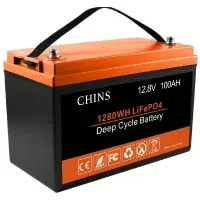
- Weight: 23.8 lbs
- Dimensions: 12.95 x 6.77 x 8.43 inches
- Rated Capacity: 100Ah/1280Wh (0.2C)
- Max Charge Current: 70A, Max Continuous Discharge Current: 100A
- Solar Panel Configuration: 300W recommended, ideal for RVs, golf carts, and yachts, with UL testing certificate.
The Chins 12V 100Ah LiFePO4 deep cycle RV battery on Amazon is incredibly cheap, which I find hard to understand, especially considering the positive reviews and the fact that it’s UL testing certified. To clear up any doubts, I decided to test it myself.
I’ve previously used a smaller Chins battery, and its build quality was impressive, but the lack of low-temperature charging protection was a dealbreaker for me. To get more clarity, I performed a capacity test and checked for the low-temp charging protection sensor.
I charged the battery up to 99% at 99 amps using a CBA4 and amplifying system. After about 5 hours, I was able to pull 1300 watts, which is excellent. The low voltage disconnect was around 9.6V, and I ultimately got 104Ah and 1316Wh, which impressed me. Most batteries at this price point fail the capacity test, but the Chins 12V 100Ah LiFePO4 passed with flying colors.
The BMS placement and cell configuration are solid, and the overall build quality and wiring placement are well-managed. However, as expected, it still lacks the low-temperature charging protection.
For solar use, overheating isn’t a major issue with lithium iron phosphate batteries, so I’m curious why the low-temp charging protection wasn’t included. Both Ampere Time and Chins 12V 100Ah LiFePO4 batteries are almost identical — same cell configuration, build quality, and even the barcodes — which leads me to believe they might be from the same manufacturer. They both feature high-temperature protection but lack low-temperature protection.
Despite missing the low-temp protection, I’m quite pleased with the Chins 12V 100Ah LiFePO4. It’s efficient, lightweight, and overall well-built. While the low-temp protection could be added, it’s easy for users to install their own if needed. The self-discharge rate is excellent, the price point is very reasonable, and it’s an ideal battery for campers.
Pros
- Excellent Current Draw
- Overall Performance on Point
- 10-Year Life Expectancy
- No Memory Effect
- Elite Build Quality and Internal Connection Management, UL Testing Certificate
Cons
- No low temp charging protection
The Chins 12V 100Ah LiFePO4 battery delivers excellent current draw and overall performance, with a remarkable 10-year life expectancy and no memory effect, making it a reliable choice for long-term use. Its elite build quality and internal connection management are impressive, backed by a UL testing certificate, ensuring safety and durability. After testing, it achieved 104Ah and 1316Wh, showing strong capacity and efficiency. However, the absence of low-temperature charging protection is a notable drawback, though this can be addressed with additional installation. Overall, it’s an outstanding battery at an affordable price, ideal for RVs and campers looking for solid performance and longevity.
Zooms 12V 100Ah LifePO4 RV Battery
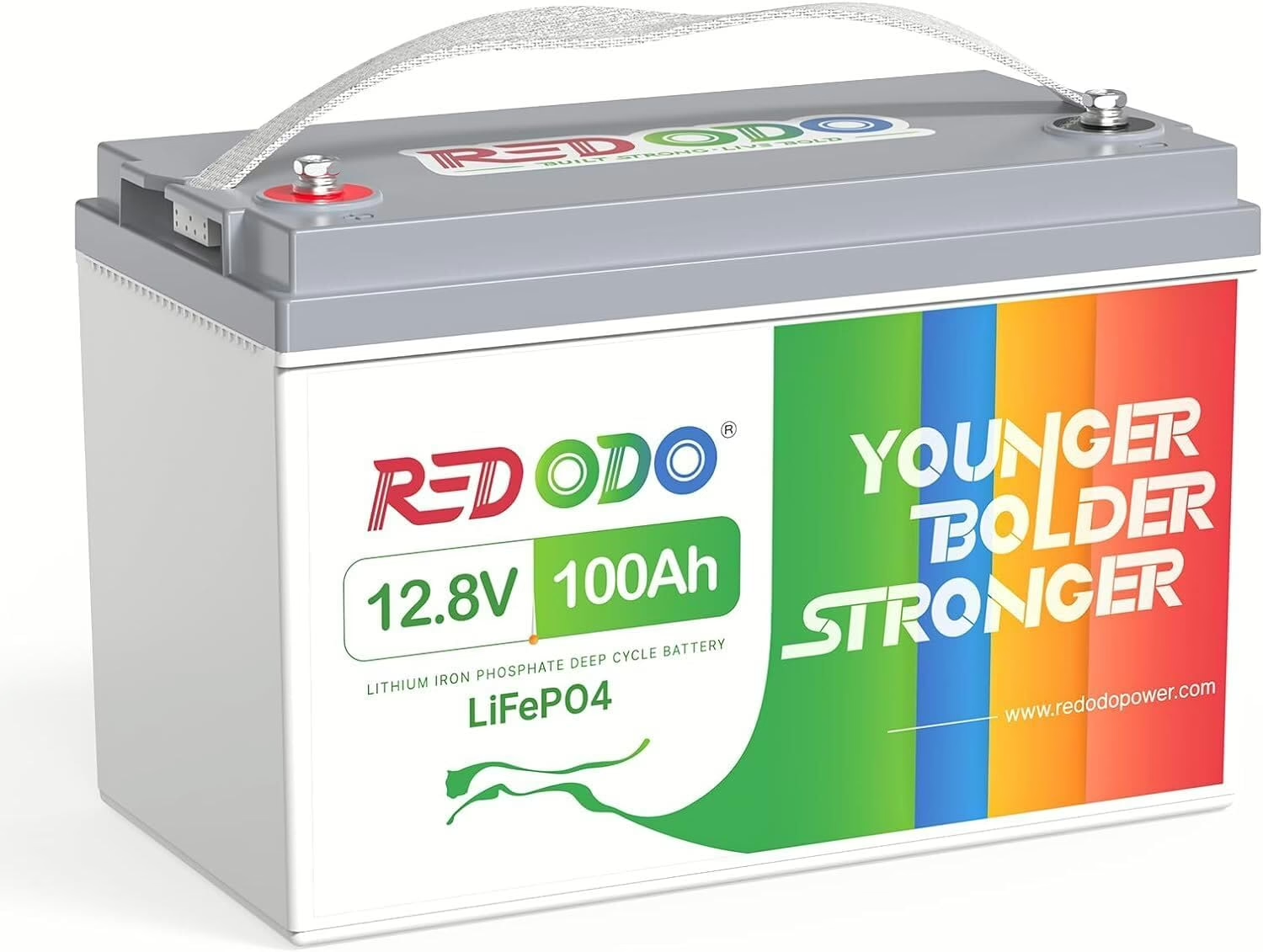
- Weight: 46.07 lbs
- Dimensions: 20.5 x 9.37 x 8.54 inches
- Service Life: 10 years
- 100% Depth of Discharge: Full discharge capability
- Waterproof & Charging Specs: Waterproof, charging voltage 14.2-14.6V, current under 100A
The Zooms 12V LifePO4 battery is a solid, reliable, and budget-friendly option for RV users seeking a durable and high-performance power source. With the ability to be recycled 4000-8000 times over its 1-year service life, it offers great value for money. This battery utilizes prismatic lithium cells, known for their high energy density, low self-discharge rates, and lightweight nature, all while maintaining quality performance.
As an owner of a Roadtrek RV, I’ve been using the Zooms battery, and its performance and weight are impressive. In contrast to my old battery, which was a struggle to install and remove, the Zooms LiFePO4 battery is much easier to handle, thanks to its lighter weight and convenient design. While it lacks low-temperature cut-off protection, which would have made it the ideal LiFePO4 battery, it still offers strong, dependable performance in various conditions.
In my tests, I put the Zooms 12V battery through its paces by using it to power an inverter for a refrigerator, as recommended by users online. To my surprise, it ran the fridge for an entire day without issue, showcasing its powerful performance.
I also tested the battery’s ability to charge at 100 amps as advertised, then pushed it up to 120 amps and 138 amps for testing purposes. Although I wouldn’t recommend charging lithium batteries at these high rates in normal use, it handled the load without any problems. After charging, I checked for a high-voltage disconnect and saw the current dropping, which indicated that the battery was properly managing its absorption phase. Running the CBA4 test for five hours at 0.2C, the result was an impressive 104.21 amp-hours, demonstrating the battery’s capacity and reliability.
The Zooms 12V battery passed all the tests with flying colors, making it a strong contender for RV use, even if it’s not the absolute best RV battery on the market. There was some initial doubt about it being similar to the CHINS battery, but after opening it up, I found the design to be nearly identical.
While the Zooms 12V LifePO4 battery is a great option in terms of performance, lightweight construction, and dependability, the lack of low-temperature charging protection is a notable drawback. That being said, the battery remains highly dependable in harsh conditions and shows excellent performance once fully charged, reading around 13.4 volts. Overall, for RV owners looking for an affordable yet powerful LiFePO4 battery, the Zooms 12V battery is a superb choice that provides great value without compromising on quality.
Pros
- 13.4 Volts After Fully Charged
- Lightweight
- Budget-Friendly
- Ideal for RV Users
- High Energy Density and Solid Build
Cons
- Takes longer to charge
The Zooms 12V LifePO4 battery offers an impressive 13.4 volts after being fully charged, ensuring solid and reliable power for your RV needs. Its lightweight design makes installation and handling easier compared to traditional options, while the budget-friendly price tag makes it an accessible choice for those seeking quality performance without breaking the bank.
Ideal for RV users, it boasts high energy density, which allows for longer-lasting power and efficient energy usage. The battery is also solidly built, showcasing durable construction that can withstand various conditions, ensuring longevity and consistent performance.
However, the only downside is that it takes longer to charge compared to some other options. While this may be a minor inconvenience, the overall value, especially for RV enthusiasts, far outweighs this drawback. With its combination of affordability, performance, and dependability, the Zooms 12V LifePO4 battery stands out as a top choice for those looking to power their recreational vehicles without compromising on quality.
ECO-WORTHY 12V 20Ah LiFePO4 RV Battery
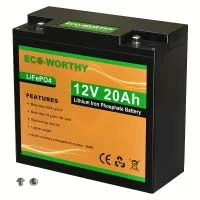
- Weight: 4.85 lbs
- Dimensions: 7.1 x 3 x 6.3 inches
- Energy: 256Wh
- Capacity: 20Ah
- Life Cycles: 3000+
ECO-WORTHY 12V battery is a compact, lightweight, and affordable option, offering great value for RV users. The battery is built solidly with high energy density and excellent safety, thanks to its Lithium Iron Phosphate technology, which allows for an 80% depth of discharge without the risk of explosion or fire. Its nominal voltage of 3.2 volts per cell is comparable to lead-acid batteries but with a longer lifespan. The battery is not only more cost-effective but also more durable than lead-acid alternatives, making it a solid investment.
In terms of performance, the ECO-WORTHY 12V batteries provide reliable power, with one user successfully wiring two 20Ah batteries in parallel for their camper. After using it for an entire day, the battery’s energy density held up well, demonstrating consistent power output even under a light load. Despite initial skepticism, the battery performed as advertised, matching the capacity and performance expectations. For those seeking lightweight, safe, and budget-friendly options for their RV, the ECO-WORTHY 12V battery stands out as a top contender.
Pros
- Affordable
- Compact and easy to handle
- Highly portable
- Impressive energy storage
- Stable current output
Cons
- Online complains about low capacity which wasn’t advertised.
The ECO-WORTHY 12V battery proves to be an excellent choice for RV users, offering a perfect blend of affordability and performance. Its compact design and lightweight nature make it incredibly portable and easy to install, while still packing a punch with impressive energy storage capabilities. The stable current output ensures that even under load, it provides reliable power for your RV needs. With a focus on cost-effectiveness without compromising on safety or durability, this battery is a solid option for campers and RV enthusiasts who need a dependable and budget-friendly power solution. Whether you’re powering lights or running small devices, the ECO-WORTHY 12V battery meets expectations while remaining easy on the wallet.
Interstate Batteries 12V 110Ah Deep Cycle Battery
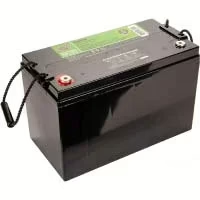
- Weight: 65 lbs
- Dimensions: 12.99 x 6.81 x 8.35 inches
- Battery Type: Lead Acid AGM Deep Cycle
- Quality: Professional grade, maintenance-free
- Ideal Use: Perfect for RVs and wheelchairs, recyclable
When it comes to choosing the best RV battery, the Interstate Deep Cycle RV Battery stands out for its superior build quality and reliable performance. Designed with valve-regulated technology, this battery is built to prevent overpressure and spillage, which is a significant advantage in terms of safety and maintenance. Right out of the box, it shows a healthy 12.74 volts without even needing a charge, offering a solid foundation for all your heavy-duty power needs.
The Interstate Deep Cycle Battery excels in providing constant current, which makes it highly dependable in various applications. I’ve personally tested it in my RV and for powering other equipment, and I can confidently say that it holds its charge for long periods. Whether it’s running a sump pump or a trolling motor, this battery’s capacity is impressive.
One of the reasons I highly recommend the Interstate battery for heavy-duty applications is its durability. Despite its relatively compact size, it offers impressive cycles, and its maintenance-free nature makes it incredibly convenient for anyone who wants reliable power without regular upkeep. With its recyclable components, it’s an environmentally friendly choice too.
However, while the 35Ah version of the Interstate battery is excellent for smaller applications like electric scooters or wheelchairs, I would suggest opting for the 110Ah version for more substantial needs, especially for RV owners. This larger capacity ensures you won’t need to worry about frequent recharges, giving you peace of mind during long road trips.
If you’re looking for a battery that can handle vibration and provide power for various devices, the Interstate battery is certainly a great option. Its solid performance in diverse conditions makes it an excellent choice for all your RV-related adventures. For a deeper dive into other top options, be sure to check out our complete RV battery guide.
Pros
- Maximized current output
- Highly dependable
- Tough and easy to move
- Simple to operate
- Exceptional cost-to-performance ratio
Cons
- No cold temp: charging protection
The Interstate deep cycle battery stands out as a solid option, especially for those seeking reliable and affordable power for RVs, wheelchairs, and other heavy-duty applications. Offering long-lasting cycles at a budget-friendly price, this battery delivers excellent value. Its lightweight design makes it easy to handle, while still providing the necessary power and durability for daily use.
Built to last, the sturdy construction ensures that this battery can endure demanding conditions without showing signs of wear. One of the standout features is its ability to retain charge for extended periods, making it a dependable choice for powering essential devices or equipment. Whether you’re powering a sump pump in Northern Illinois or running a trolling motor on a boat, the Interstate deep cycle battery holds its charge well and provides consistent performance.
Although not the highest capacity battery on the market, the 110Ah version offers ample power for most RV needs, and the 35Ah version excels in smaller applications where vibration resistance is crucial. If you’re looking for a solid and dependable battery that delivers on its promises, the Interstate deep cycle battery is certainly worth considering. Its well-built design, charge retention, and affordable price make it a reliable companion for various off-grid applications.
Weize 12V 100AH Pure Gel Deep Cycle Battery
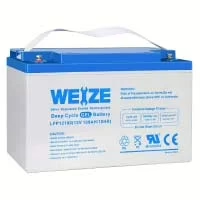
- Weight: 67lbs
- Discharge Cut-off Voltage: 10.8V
- Maximum Charge Current: 100A
- Technology: Valve Regulated Lead-Acid
- Ideal Applications: Scooters, RVs, and Golf Carts
My first impression of the Weize 12V battery was that it has a very similar design to both the Zooms and Chin batteries. However, one notable concern I had was the lack of low-temperature charging protection, which could be problematic in cold environments. Despite this, I decided to put it through a series of tests to get a better understanding of its true performance.
For the first test, I ran a capacity test to compare its performance to other similarly priced batteries. To my surprise, the Weize 12V pulled 103 amp-hours, just 1 amp-hour less than some of the other cheaper batteries I’ve tested, which typically provide around 104 amp-hours. While this might seem negligible, the small difference speaks to the consistency of this battery’s performance in comparison to its competitors.
Curious about the battery’s internal components, I carefully dismantled the Weize 12V to see what was inside. Upon inspection, I found that it contained five main negative conductors, which led me to believe it’s not just a repackaged Chin’s battery, as I initially suspected. This gave me confidence that the Weize 12V might be a unique product with its own design.
One of the most impressive features that stood out to me was the BMS (Battery Management System). The advertisement claimed the Weize 12V had both high and low-temperature protection, and after testing it, I was genuinely shocked to find that the temperature sensor worked perfectly when I dipped the battery into ice-cold water. This was an unexpected but welcome surprise, especially given the price point. It’s rare to find a budget battery with such robust features, and the Weize 12V might just be the best affordable option I’ve come across so far.
With a 100Ah capacity, the Weize 12V is more than sufficient for running most appliances on your RV, as long as you ensure that it’s not overcharged. I also put it to the test with a 400-watt solar panel and a 1000-watt inverter, and it worked flawlessly. Given that this is a LiFePO4 (Lithium Iron Phosphate) battery, it’s designed to last longer than traditional lead-acid batteries, which adds to its overall value.
Overall, the Weize 12V battery provides excellent performance for its price. It offers a decent lifespan, high energy density, and solid features like temperature protection. If you’re looking for a reliable, budget-friendly battery for your RV or other applications, this is definitely a strong contender. While it may not have all the bells and whistles of higher-end batteries, it performs impressively well considering its affordable price tag.
Pros
- Temperature Protection
- Ideal for RVs
- Strong Performance
- Compact Design
- Great Value
Cons
- Mounting equipment is not included in the package.
The Weize 12V battery is an impressive option for anyone looking for a reliable and budget-friendly power source. With its BMS for high and low-temperature protection, it stands out in terms of safety, offering peace of mind for RV users. The compact design ensures it fits comfortably in smaller spaces, making it perfect for various applications. Performance-wise, it provides excellent power output, and when paired with solar panels or an inverter, it holds up well in demanding scenarios. For its price, it offers great value for money, making it an ideal choice for those seeking an affordable yet efficient deep cycle battery. Overall, the Weize 12V is a solid, reliable choice for RVs and other similar uses, offering long-term durability and peace of mind.
Ampere Time 12V 100Ah Lithium LifePo4 Battery
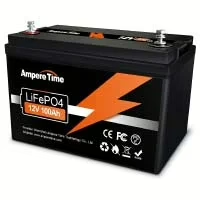
- Weight: 25.55lbs
- Dimensions: 13 x 6.82 x 8.48 inches
- 4000+ cycles for extended lifespan
- 12.8V operating voltage for reliable performance
- Perfect for RVs, campers, and outdoor activities
The Ampere Time 12V battery is a premium LifePo4 option widely recognized in the RV battery industry. Available in 100Ah, 200Ah, and 300Ah models, the main difference lies in their capacity and energy storage. Many users consider Ampere Time as the best RV battery under certain conditions, and I can understand why after testing it myself.
Before fully trusting it, I conducted a capacity test and a full-load discharge test, as I had read some reviews questioning the low-temperature charging protection. I’m happy to report that the battery passed the test without issue, performing admirably under load.
After using it for a while, I dismantled the battery to check its build quality. I was thoroughly impressed. The terminals are solid with lock washers, and it uses high-quality 10 copper 8-gauge wire, which is exceptional for a 100Ah battery. This level of build quality is a strong point in favor of the Ampere Time 12V.
However, when testing the low-temperature charging protection by dipping the temperature sensor into cold water, I found that it didn’t work as expected. On the positive side, it does provide reliable protection against high temperatures, which is a key feature for those who need to safeguard their battery in warmer conditions.
For those who can avoid cold temperatures, this battery is an excellent choice. I also tested the 200Ah version of the Ampere Time 12V in my RV, where I ran all the appliances, including lights, to measure the maximum draw. The battery lasted for 8 hours and 20 minutes at 908 watts of peak draw, providing a stable output. Even under load, I was able to extract around 2.22kW from the inverter, with the battery performance remaining strong.
On a rainy day, I got around 45Ah from my charge controller and nearly 150Ah from my Victron charger, showing that the Ampere Time battery is very efficient at charging and discharging. I could have squeezed more out of it if I had lowered the load further.
In conclusion, the Ampere Time 12V battery is incredibly reliable, has solid build quality, and provides excellent performance. It’s surprisingly lightweight for its size and offers a great balance of price and performance, making it an ideal choice for RVs and campers. If you’re not worried about cold temperatures, I highly recommend this battery for anyone looking for a durable and high-performing option.
Pros
- Maximized current output
- Highly dependable
- Tough and easy to move
- Simple to operate
- Exceptional cost-to-performance ratio
Cons
- No cold temp: charging protection
The Ampere Time 12V LifePo4 RV battery is a standout in the market for its exceptional performance, reliability, and affordability. Despite its compact and lightweight design, it offers maximized current output, making it ideal for powering RVs, campers, and outdoor activities. Its durability and portability allow it to withstand harsh environments, while the ease of use ensures that even those new to RV power systems can easily install and maintain it.
While the low-temperature charging protection may not function as advertised, its high-temperature protection and overall reliability more than make up for this minor flaw. With a solid full current draw capability and superb energy storage, it delivers fantastic value for the money, especially considering its long-lasting cycles and the low self-discharge rate.
For anyone seeking a durable, reliable, and budget-friendly battery for RV use, the Ampere Time 12V is a highly recommended option that won’t disappoint. It strikes a perfect balance between performance and cost-effectiveness, making it an excellent investment for those looking to enhance their off-grid adventures.
Battle Born LiFePO4 Deep Cycle Battery
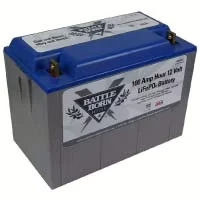
- Weight: 29lbs
- Dimensions: 12.75 x 6.88 x 9 inches
- Cell Composition: Lithium-ion
- Built-in BMS: Integrated for safety and protection
- Mounting Flexibility: Can be mounted in any position, versatile installation
Battle Born is widely recognized as one of the most durable, lightweight, compact, and reliable RV batteries available on the market.
Each battery is built with four parallel packs, totaling 120 cells, with each cell featuring a nominal voltage of 3.2V and a capacity of 3.4Ah. When combined, this results in 10.88Wh per battery cell, which is impressive. Although advertised at 1280Wh, the real capacity is actually 1305Wh.
The battery utilizes a cylindrical lithium-ion series, which ensures that if one cell fails, the others can still function, albeit with slightly reduced capacity.
One of the key advantages of the Battle Born LiFePO4 Deep Cycle Battery is its ability to be safely used indoors. Unlike traditional batteries, it does not emit hydrogen gases, allowing users to mount it inside cabins or even in crawl spaces.
The integrated temperature sensor connected directly to the cell ensures safe operation, even in varying conditions.
With its robust power capacity, the Battle Born battery is an excellent choice for RV and long-haul vehicle users. Many opt to purchase multiple units (typically 3 or 4) to provide continuous power. I personally tested 4 of these batteries with a 2000W solar setup and a 3000W inverter, and they performed flawlessly, even when running 400-700W overnight.
After six months of use, I can confidently say that these batteries continue to impress with their exceptional build quality, power, and reliability.
When compared to AGM batteries, Battle Born LiFePO4 stands out due to its ability to handle temperature fluctuations and its long-lasting performance. AGM batteries are typically less expensive, but Battle Born provides more power, longer lifespan, and a higher quality BMS (battery management system).
While the price point may seem steep, the value these batteries offer is undeniable. With a cycle life of 3000-5000 cycles while retaining over 75% of their original capacity, these batteries are built to last and are among the top choices for RV enthusiasts.
Pros
- Long lifespan: 3000–5000 cycles, 75%+ capacity retention
- Powerful performance: Reliable in all situations
- High output: Exceeds rated power
- Non-toxic lithium: Safe and eco-friendly
- Durable: Built for long-lasting use
Cons
- A bit costly
The Battle Born LiFePO4 Deep Cycle Battery is an excellent choice for anyone in need of a reliable, high-performance RV battery. With a lifespan of 3000 to 5000 cycles and the ability to retain over 75% of its original capacity, it offers long-term reliability. The battery’s powerful performance ensures it won’t let you down in demanding situations, while it provides more power than its rated output, making it ideal for off-grid living or extended road trips. Additionally, its non-toxic lithium composition makes it both safe and eco-friendly. With its durable build and the added benefit of a quality BMS, this battery is built to last, providing consistent performance for years to come. Though the initial cost may be higher, the value it offers in terms of longevity, efficiency, and safety makes it an investment worth considering.
ExpertPower 12V 100Ah lithium LifePo4
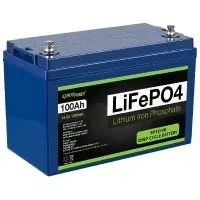
- Weight: 22.6lbs
- Dimensions: 13 x 6.8 x 8.4 inches
- Cycle Life: 2500 cycles with 100% DOD, 3600 with 80% DOD, and 7000 cycles with 50% DOD
- Max Discharge Current: 100A (continuous), 200A (2 seconds)
- Nominal Voltage: 12.8V
Friend recommended the ExpertPower 12V 100Ah due to its UL certification and affordable price under $800, which made it an attractive option. After purchasing it on Amazon, I found that this battery comes with a built-in BMS (Battery Management System) and low charging temperature protection, which is something a similar-priced option like the Ruxu battery lacks.
One of the key specs of the ExpertPower 12V 100Ah battery is its discharge rate of 70 amps and continuous charge rate of 50 amps. When connecting to a large inverter, it’s essential to understand the maximum continuous discharge rate and match it with the inverter’s power requirements. If necessary, you could connect multiple batteries in parallel to meet your energy needs.
I performed an initial capacity test to evaluate its performance. Charging it, I noticed about 30 amps were going into the battery, which is a good sign. After conducting a maximum load test, I pulled 9 minutes of continuous use and 5Ah of power, which was within acceptable limits.
Running the battery to its depletion, I ended up with 110Ah and 1410Wh output — roughly 10-11% more than what the manufacturer advertised. This was impressive and showed that the ExpertPower 12V 100Ah could deliver more than expected.
I then tested the battery in extreme conditions by placing it in the refrigerator. While I anticipated it would stop charging due to the cold, it continued charging. This was a clear sign that the battery doesn’t have low temperature charging protection, which is a downside. However, a Victron solar charge controller would take care of this issue by preventing charging in low temperatures.
Despite the lack of low temperature protection, the ExpertPower 12V 100Ah is solidly built with well-made cells, connections, and BMS. In terms of performance, weight, and longevity, this is a top-tier budget-friendly RV battery. While it does lack some advanced temperature protection features, it’s still an excellent option for most applications, especially considering its cost-effective price point. Overall, I highly recommend it for RV users, especially if you’re not worried about extreme cold conditions.
Pros
- Excelled in capacity test
- Lightweight design
- Outstanding performance for RVs and campers
- Provides 10–11% more power than advertised
- Solid construction
Cons
- Doesn’t have low temp: charging protection
How to Choose an RV Battery – Buying Guide
After hours of research, testing, and collecting data, we’ve compiled not just a list of the top 10 best RV batteries, but also a comprehensive guide to help you make an informed purchasing decision. Here’s a breakdown of the different types of RV batteries to consider before you make your choice:
Types of RV Batteries
Flooded Batteries:
These are the most common type of wet-cell batteries. Flooded batteries are affordable, durable, and widely available. However, they require regular maintenance and have a shorter lifespan compared to other types. One downside is that they don’t perform well under heavy vibration.
AGM (Absorbent Glass Mat) Batteries:
AGM batteries are sealed lead-acid batteries that require minimal maintenance and are highly reliable. They are a great option if you plan to live off-grid. However, they do have a major drawback—they don’t perform well in cold climates, which limits their effectiveness in certain environments.
Lithium Batteries:
Lithium batteries are considered ideal for RV users due to their long lifespan, durability, and high reliability. They are powerful, vibration-resistant, and work in extreme climates, including freezing temperatures. Though more expensive upfront, lithium batteries are a great long-term investment due to their extended cycle life and low maintenance needs.
Our list of the Top 10 Best RV Batteries will guide you in selecting the best option based on your specific needs, whether you’re looking for affordability, reliability, or all-weather performance.
Weather and Cold Conditions:
When choosing an RV battery, it’s crucial to consider how it will perform in cold weather. Different battery types have varying levels of resistance to freezing temperatures and efficiency in harsh conditions. Here’s a breakdown of how different types of batteries handle the cold:
AGM Batteries
Some AGM batteries, like the Optima RedTop, are designed to handle cold weather. With 800 cold-cranking amps, these batteries can power your RV in freezing conditions, though they still might not be as efficient as other types in extreme cold.
Gel Batteries
Gel batteries are excellent for cold climates because they are less prone to freezing compared to other lead-acid batteries. They can withstand lower temperatures without significant performance loss, making them ideal for winter RV adventures.
Lead-Acid Batteries
Traditional lead-acid batteries generally do not perform well in cold temperatures. Their capacity and efficiency can drop dramatically in freezing conditions. If you plan on using a lead-acid battery in cold climates, it’s recommended to use battery compartments with heating pads to maintain performance.
Lithium Batteries
Lithium batteries, such as the Chins 12V 100Ah or Zoom batteries, perform exceptionally well in cold conditions. However, they do require a bit of pre-heating before charging, so they may need to be brought to room temperature before charging to ensure optimal performance. Despite this, lithium batteries are still one of the best options for cold-weather use due to their long lifespan and high efficiency.
Battery Management System (BMS)
When choosing a battery for cold weather, always keep the BMS (Battery Management System) in mind. A BMS protects the battery from both high and low-temperature charging, ensuring that it operates safely and effectively even in extreme temperatures. Most modern batteries come with a built-in BMS, but it’s always a good idea to double-check.
Cost
While cold-resistant batteries like lithium or gel options offer excellent performance in winter, they often come at a higher cost. However, their long lifespan and reliability in extreme conditions make them a worthwhile investment for those who frequently travel in colder climates.
Battery Size
When choosing an RV battery, the size matters a lot, especially when it comes to weight and space. If you’re like me, you probably don’t want to deal with a bulky, heavy battery. It’s best to go for a lightweight and compact battery that fits your RV’s available space. Instead of purchasing one large battery, consider opting for 2 or 3 smaller capacity batteries to meet your needs. This way, you avoid the hassle of dragging around a heavy unit, and it gives you flexibility in case you need to expand your power setup later.
Power Capacity
The power capacity you need depends on how many appliances you plan to run in your RV. While every situation is different, 200Ah is a good rule of thumb for most RV users. It provides enough power for emergencies or extended off-grid trips. Additionally, combining a 12V setup with solar panels can help ensure that your battery stays charged, even when you’re in remote locations without access to electrical hookups.
Lifespan
Battery lifespan is crucial when considering long-term costs. Lead-acid batteries generally last around 3 to 5 years, but lithium batteries can last up to 10 years, making them a better investment in the long run. Even though we don’t typically use our batteries for the full lifespan, going for lithium batteries is a smart choice for durability and longevity. To extend the life of any battery, be mindful not to overtax it or consistently drain it to 0%. Proper maintenance will help it last longer and function more efficiently.

